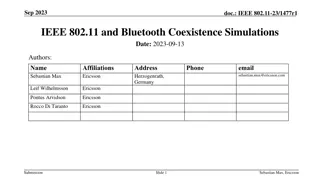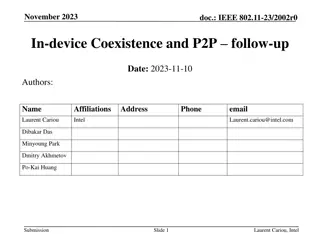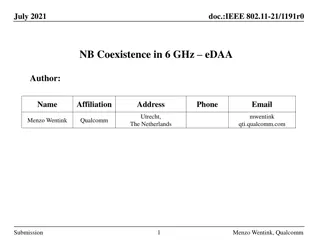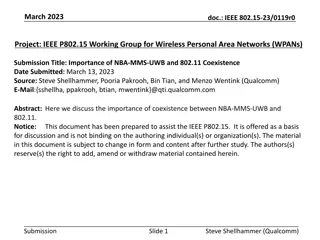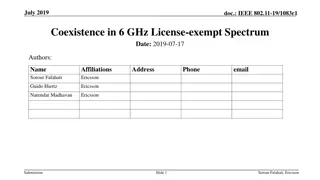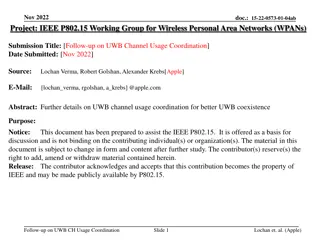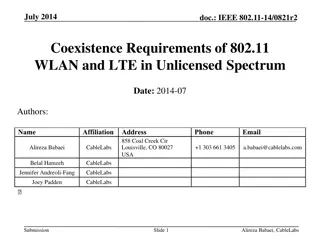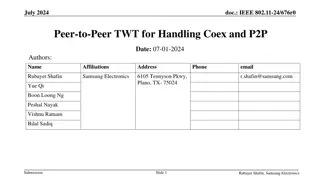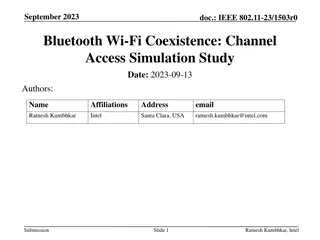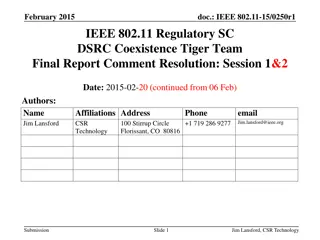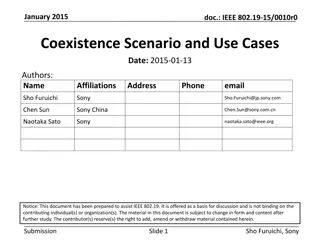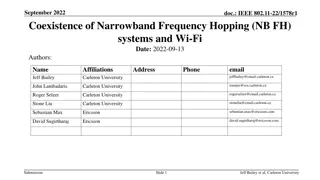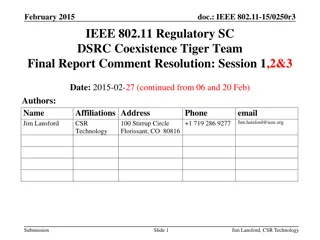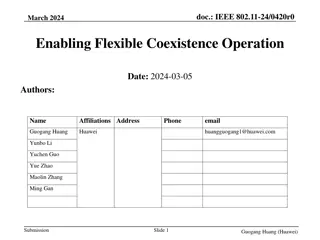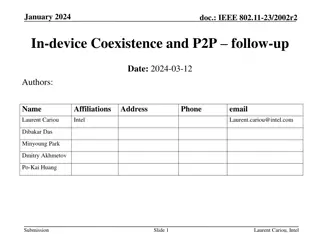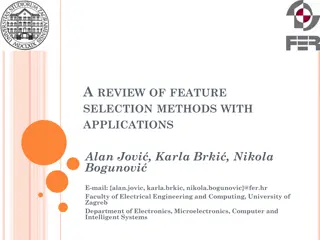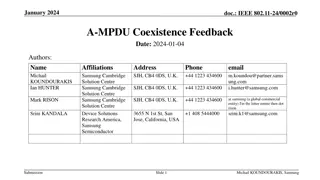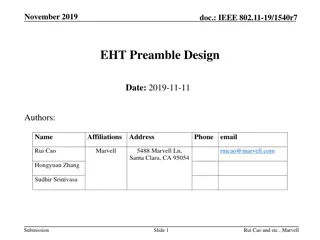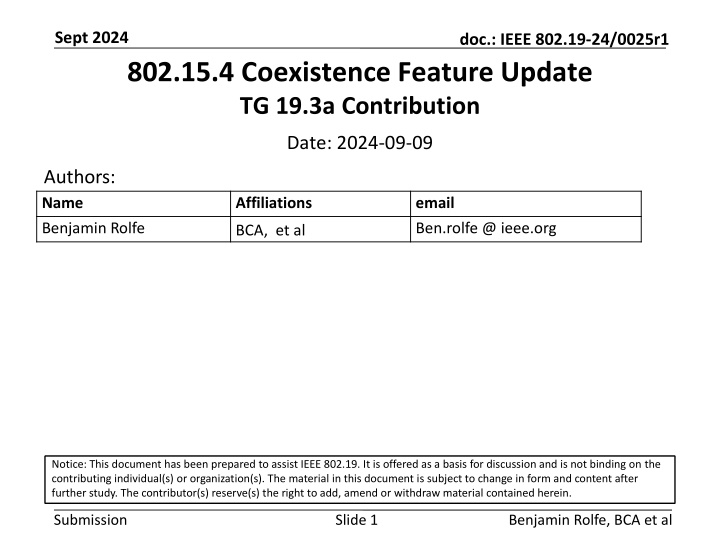
802.15.4 Coexistence Feature Update
This document, dated September 2024, provides an update on the coexistence features of IEEE 802.15.4. It presents a contribution by Benjamin Rolfe, affiliated with IEEE, regarding the TG 19.3a. The content focuses on enhancing coexistence mechanisms within the wireless communication standards for improved functionality and compatibility.
Download Presentation

Please find below an Image/Link to download the presentation.
The content on the website is provided AS IS for your information and personal use only. It may not be sold, licensed, or shared on other websites without obtaining consent from the author. If you encounter any issues during the download, it is possible that the publisher has removed the file from their server.
You are allowed to download the files provided on this website for personal or commercial use, subject to the condition that they are used lawfully. All files are the property of their respective owners.
The content on the website is provided AS IS for your information and personal use only. It may not be sold, licensed, or shared on other websites without obtaining consent from the author.
E N D
Presentation Transcript
Sept 2024 doc.: IEEE 802.19-24/0025r1 802.15.4 Coexistence Feature Update TG 19.3a Contribution Date: 2024-09-09 Authors: Name Affiliations email Benjamin Rolfe Ben.rolfe @ ieee.org BCA, et al Notice: This document has been prepared to assist IEEE 802.19. It is offered as a basis for discussion and is not binding on the contributing individual(s) or organization(s). The material in this document is subject to change in form and content after further study. The contributor(s) reserve(s) the right to add, amend or withdraw material contained herein. Submission Slide 1 Benjamin Rolfe, BCA et al
Sept 2024 doc.: IEEE 802.19-24/0025r1 Summary 802.15.4 has had several amendments and a revision since 2019 Some useful features have been added to the MAC that we could use to enhance coexistence Some changes have been made to add flexibility that could be used for coexistence recommendations This identifies some new or revised features that might be useful to this group Submission Slide 2 Benjamin Rolfe, BCA et al
Sept 2024 doc.: IEEE 802.19-24/0025r1 802.15.4 Channel Access: 802.15.4-2024 (Revision E) Multiple CSMA variations o Multiple Clear Channel Assessment Methods o Multipole Prioritized CSMA schemes o Suspendable CSMA-CA algorithm *new* Multiple scheduled access methods o Some with, some without CSMA o Some cleanup in Revision E o Some changes to make TSCH more general in draft 15.4ab o Peer-wise coordination (distributed) added in 802.15.4z o Some use channel access with sensing (listen) in conjunction with scheduled access New variation of CSMA that uses linear backoff and finer control of timing to support low latency Submission Slide 3 Benjamin Rolfe, BCA et al
Sept 2024 doc.: IEEE 802.19-24/0025r1 Multiple CCA methods Mode 1: Energy above threshold (ED). Mode 2: Carrier sense only (CS) CCA Mode 3: Combination of ED and CS ED Threshold and Duration variable Flexibility to meet different operating environments, performance profiles, and regulator requirements Submission Slide 4 Benjamin Rolfe, BCA et al
Sept 2024 doc.: IEEE 802.19-24/0025r1 Random Access: multiple CSMA Variations Simple unslotted CCA Slotted CSMA with scheduled access o Multiple superframe types defined o TSCH, DSME and RCC support slotted CSMA CSMA with Priority (PCA) Added flexibility since 802.15.4-2020 to CCA and CSMA-CA Submission Slide 5 Benjamin Rolfe, BCA et al
Sept 2024 doc.: IEEE 802.19-24/0025r1 Brief look at CSMA Simple and flexible o Can reduce to simple LBT without iterative backoff o Can bound backoff growth Submission Slide 6 Benjamin Rolfe, BCA et al
Sept 2024 doc.: IEEE 802.19-24/0025r1 Optional backoff suspension in CSMA-CA algorithm Incorporated into 802.15.4-2024 (Rev E) Adds capability to sensed channel using the selected CCA mode during the backoff delay period. Provides improved performance in congested spectrum Grew out of changing requirements in key applications such as smart energy/grid modernization in Japan and other regions Expands trade-off space for optimizing and adaptation More information: https://mentor.ieee.org/802.15/dcn/23/15-23-0234-02- 04me-proposed-csma-changes.docx https://mentor.ieee.org/802.15/dcn/23/15-23-0167-00- 0000-the-csma-gap-analysis-between-ieee-802-15-4-and- japanese-standard-jj-300-10.pptx Submission Slide 7 Benjamin Rolfe, BCA et al
Sept 2024 doc.: IEEE 802.19-24/0025r1 Added contention-based channel access introduced in draft P802.15.4ab: SSBD Spectrum Sensing Based deferral CSMA with linear ba ckoff and a few other changes Iterative sense/backoff/sense as in CSMA o Uses linearly growth in random backoff o Provides for fine resolution bounding of channel access latency o Intended for low-latency use cases Include optional persistence o Simplified version of 802.11 persistent channel access o Alters channel backoff bounds for retransmission attempts Submission Slide 8 Benjamin Rolfe, BCA et al
Sept 2024 doc.: IEEE 802.19-24/0025r1 SSBD Similar to CSMA with o Linear backoff growth o Can reduce to simple LBT o Includes fallback to Aloha option o Optimized for low- latency uses o Includes optional persistence Submission Slide 9 Benjamin Rolfe, BCA et al
Sept 2024 doc.: IEEE 802.19-24/0025r1 802.15.4s Spectrum resource measurement (SRM) (rolled into 802.15.4-2024) Provides functionality and data structures to exchange MAC performance and spectrum characterization information o Channel access and retransmission performance o Receiver performance o Channel characterizations Could be useful for new coexistence recommendations Submission Slide 10 Benjamin Rolfe, BCA et al
Sept 2024 doc.: IEEE 802.19-24/0025r1 Other possibly interesting things: 802.15.9 Created to support Key Management Protocol transport over 802.15.4 Includes fragmentation which might be useful for link adaptation Submission Slide 11 Benjamin Rolfe, BCA et al
Sept 2024 doc.: IEEE 802.19-24/0025r1 Conclusion These are just a few of the changes and new features since 2019 Lots of tools we can use This is only half of the story (802.15.4) Next step: look into 802.11-2024 Submission Slide 12 Benjamin Rolfe, BCA et al

